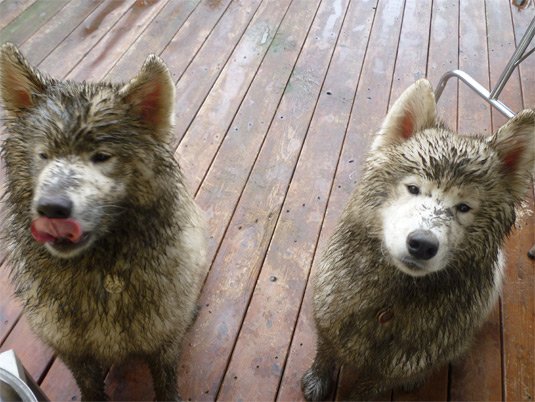Bad Habits and Training

Every breed has bad habits and the Samoyed is no exception. This is a working breed that enjoys action, herding and attention. They can easily become bored with nothing of interest at hand. They will dig — in fact they are excellent excavators by nature, digging deep into the snow for protection against the bitter cold winds in their native land.
They are excellent watchdogs but will not keep barking continually while your guests are present. They bark when company arrives; after they see who it is and receive recognition that they were heard, they will typically cease. It is not natural for them to keep barking unless they are tied, bored, teased or ignored.
This is a highly intelligent breed; they have a keen sense of being loved or neglected. The more intelligent the dog, the more things he will figure out to gain attention, good or bad. It takes a highly intelligent human to cope with some of them, animal wise. No two are alike. Environment makes the difference.
There are Samoyeds who have a propensity for foreign objects. Many Sams can be given the full run of the house from the time they are puppies while others will be a problem as long as they live. Early training usually conforms the puppy into a well-mannered adult.
The chewing of hair off the front legs, skirts and tail is often from sheer boredom. A dog left alone for the day will often do this. A bitter spray is available in pet stores and advertised in dog magazines. The sooner you spray the area, the more apt you will be to break a future habit as this usually discourages it. Giving him a toy or rawhide bone to chew on will also help him pass the time.
Basic Training for Samoyeds
It is recommended that puppies attend a puppy kindergarten/ socialization class where owners are taught how to establish a working relationship with their dogs, and puppies receive important socialization with people and other dogs. Samoyeds and their owners benefit from obedience classes at least through the pup’s first year of life. Samoyeds generally want to please a fair and consistent owner and generally are very trainable with voice commands. Harsh training methods are usually not necessary, with a properly bred Samoyed.
To find obedience instructors, ask the breeder or a local veterinarian. Many local kennel clubs offer public classes. Another source of instructors is the National Association of Dog Obedience Instructors which routinely advertises in dog publications.
Samoyeds can be very vocal, in part due to their unusual intelligence. They should be taught the meaning of “Quiet” and “Settle”, for their owners’ and neighbors’ benefit.